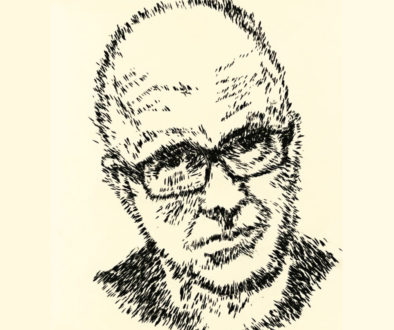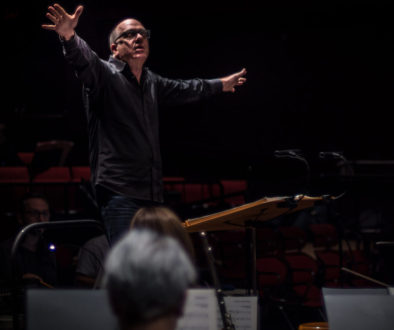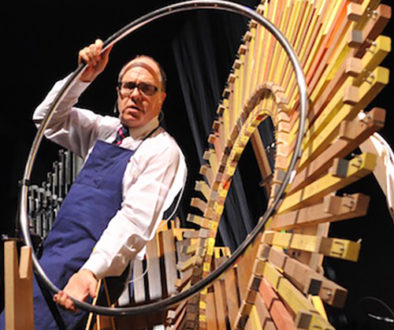Percussionist Steven Schick is wizard of noises
By Joshua Kosman, SFGate
Originally published February 18, 2014; full text and original article visible here.
“To call Steven Schick one of the great percussion virtuosos of our time is accurate as far as it goes, but it doesn’t go nearly far enough. As Friday’s exhilarating solo recital at the JCC of San Francisco made clear, Schick is also an actor, mime, storyteller and all-around spellbinder – albeit a low-key one – on stage.
Perhaps none of that should be too surprising for an artist who casts such a deliberately wide net. A percussionist, as Schick told the audience, is “a linguist in the language of noises.”
Certainly Friday’s program – presented by the San Francisco Contemporary Music Players, of which Schick is the artistic director – seemed designed to showcase not only his own gifts, but the polyglot range of sounds that can fall under the heading of “percussion music.” A diverse smorgasbord of 10 pieces drawn from the past half-century, it included everything from straightforward rhythmic etudes to exercises in sheer theatrical whimsy.
Schick established a ground plan almost from the start, with two contrasting early landmarks of the solo percussion repertoire. On one side was Stockhausen’s “Zyklus” from 1959 (sometimes billed as the first piece for solo percussion), with all its restless energy and kitchen-sink unpredictability coming through in a taut performance.
On the other was “The King of Denmark,” Morton Feldman‘s 1964 collection of characteristically whisper-faint sonorities. The palette of sounds here – vague insinuations from a cymbal, faint skitterings from a drum head – is all delivered with the bare hands, and sometimes teeters so close to inaudibility as to be more an implication of music than music itself.
Alongside those explorations of the coloristic possibilities of the instruments were other pieces that dove deep into a world of rhythmic complexity. Two works by Iannis Xenakis, “Rebonds” and “Psappha” – simply scored but full of expressive power – stood as testaments to the ability of pure rhythm to exert a pull. And the even greater rhythmic challenges of Brian Ferneyhough‘s “Bone Alphabet” sounded almost lyrical in Schick’s hands.
Then there was repertoire that called for an even greater range of performance skills than are taught in most conservatories. In Vinko Globokar’s inventive and poignant “Toucher,” Schick was called on to recite swatches of Bertolt Brecht’s play “Galileo” in French translation, while using various percussion instruments – a tambourine, a cowbell – to simultaneously mimic the vowel sounds of the text.
“Wendell’s History,” a diptych by Gustavo Aguilar whose two parts framed the concert, had him reciting the words of the American poet Wendell Berry while chiming background sounds emerged from a hand-held tape recorder. And in perhaps the most dazzling piece of theatrical legerdemain, Mark Applebaum‘s “Aphasia” required Schick to go through a tightly choreographed repertoire of physical gestures in time to a prerecorded sound track – the mastery of rhythmic patterns in an alternate form.
Schick dispatched all of it from memory, with an easy grace that gave no hint of the technical difficulties involved. He’s some kind of wizard.”


